2024 SDG 6 English
- 6.2.1 Water consumption tracking
- 6.3.1 Wastewater treatment
- 6.3.2 Preventing water system pollution
- 6.3.3 Free drinking water provided
- 6.3.4 Water-conscious building standards
- 6.3.5 Water-conscious planting
- 6.4.1 Water reuse policy
- 6.4.2 Water reuse measurement
- 6.5.1 Water management educational opportunities
- 6.5.3 Off-campus water conservation support
- 6.5.5 Cooperation on water security
- 6.5.6 Promoting conscious water usage on campus
- 6.5.7 Promoting conscious water usage in the wider community
6.2.1 Water consumption tracking
The Environmental and Public Safety Center is responsible for tracking and managing water consumption across all campuses annually. In 2023, the total water consumption for the Heping Campus, Gongguan Campus, and Linkou Campus amounted to 604,053 cubic meters.
NTNU water consumption in the past four years
Year | 2020 | 2021 | 2022 | 2023 |
Water consumption across the campus (m3) | 593,982 | 574,444 | 592,114 | 604,053 |
6.3.1 Wastewater treatment
General Wastewater Treatment
The three NTNU campuses have their own wastewater treatment procedures based on their respective administrative regions, with the Office of General Affairs responsible for overseeing and managing these processes. Wastewater from the Gongguan and Heping campuses is directed to the Taipei City Sewer System for treatment (sewage pipeline data for two campuses). For the Linkou campus, domestic wastewater from each building is connected to a septic tank for primary treatment, after which it is discharged, along with rainwater, into external wastewater treatment systems.
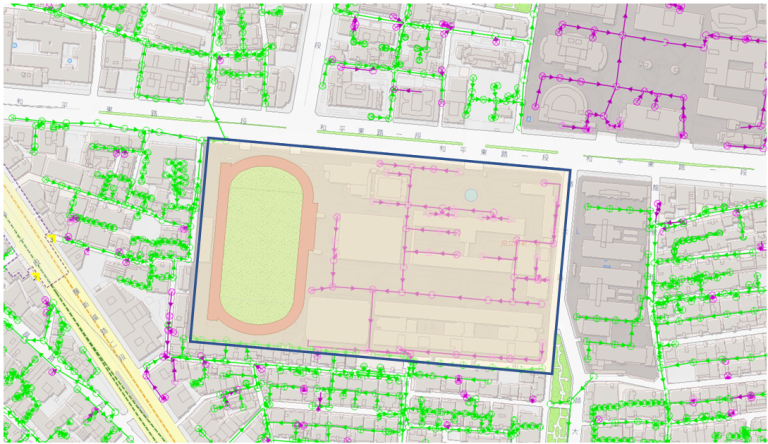
6.3.2 Preventing water system pollution
Laboratory Wastewater Management
NTNU follows the Environmental Protection Administration’s Waste Disposal Act for handling chemical waste, as outlined in the “Laboratory Hazardous Waste Management Guidelines.” Chemical waste is classified based on its hazardous characteristics, stored in appropriate containers, and labeled accordingly. The waste is then safely stored and labeled for collection. The University contracts certified waste disposal companies to transport and dispose of the waste, ensuring compliance with all regulations. Waste disposal is carried out monthly at the Gongguan Campus and 1-2 times annually at the Heping and Linkou campuses. In 2023, 12,155 kilograms of chemical waste was transported and processed.
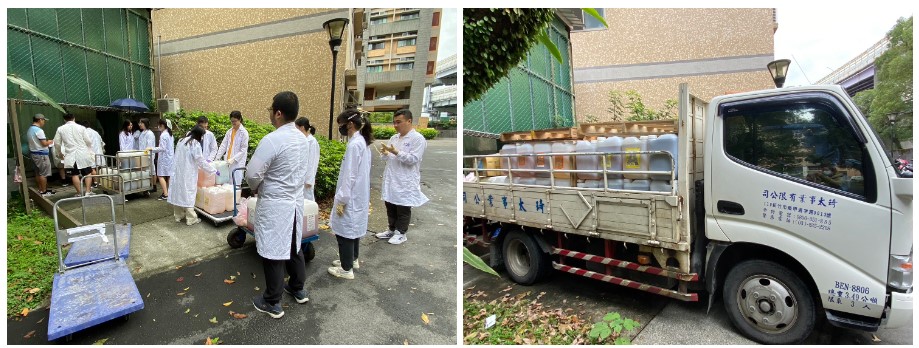
Chemical waste cleaning situation.
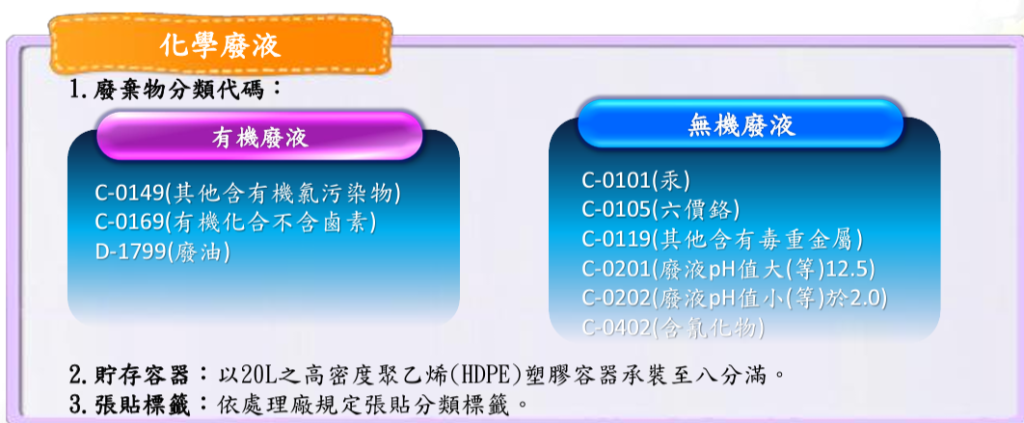
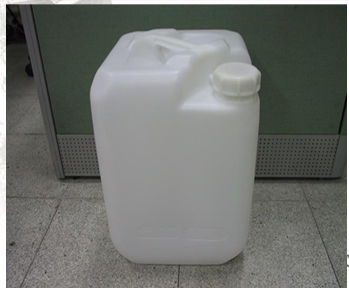
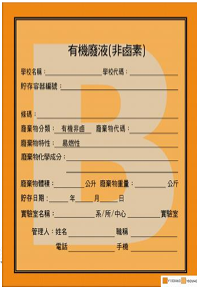
Chemical waste hazardous characteristics, storage containers, and classification labels.
2.The Department of Chemistry has established a wastewater treatment plant and a waste liquid storage facility to enhance the management of laboratory waste. All wastewater from laboratory experiments and exhaust ventilation systems is treated and tested to ensure compliance with the Environmental Protection Administration’s standards for laboratory waste discharge.
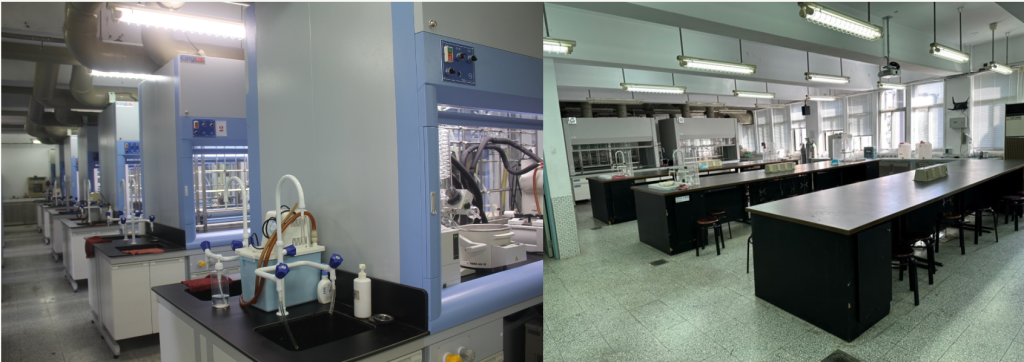
6.3.3 Free drinking water provided
NTNU provides free drinking water to students, staff, and visitors through 503 water dispensers. Additionally, to ensure drinking water safety, the university’s Health Center implements drinking water safety management and tracking according to the “Drinking Water Management Regulations” and the “Regulations for the Use and Maintenance of Continuous Supply Fixed Drinking Water Equipment.” External contractors and the Health Center conduct regular water quality inspections; water quality reports are publicly available for transparency.
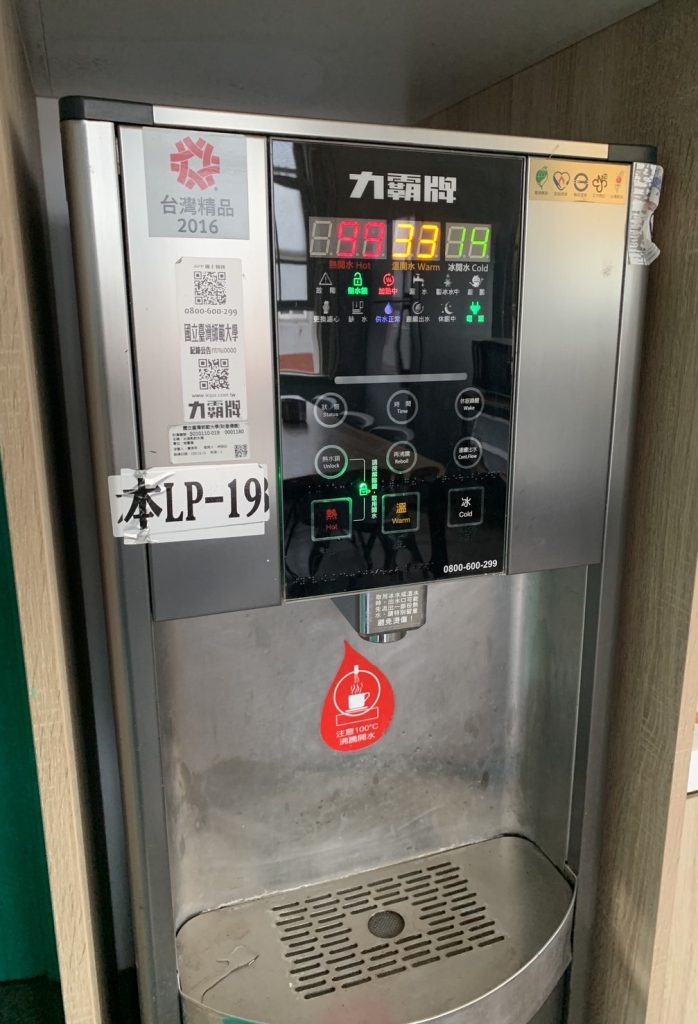
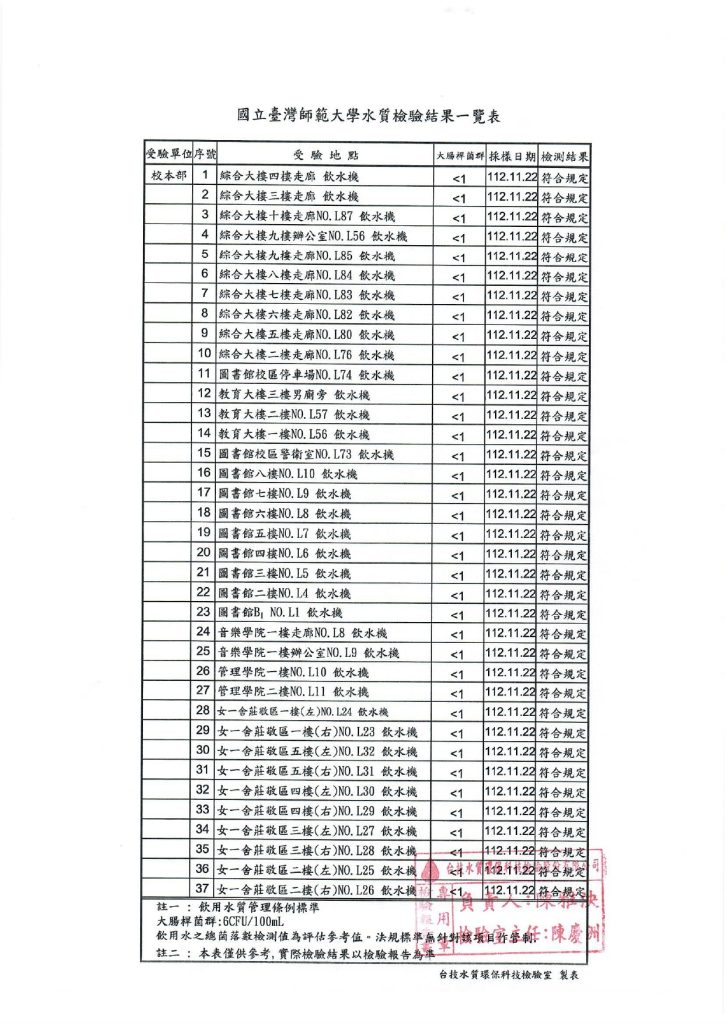
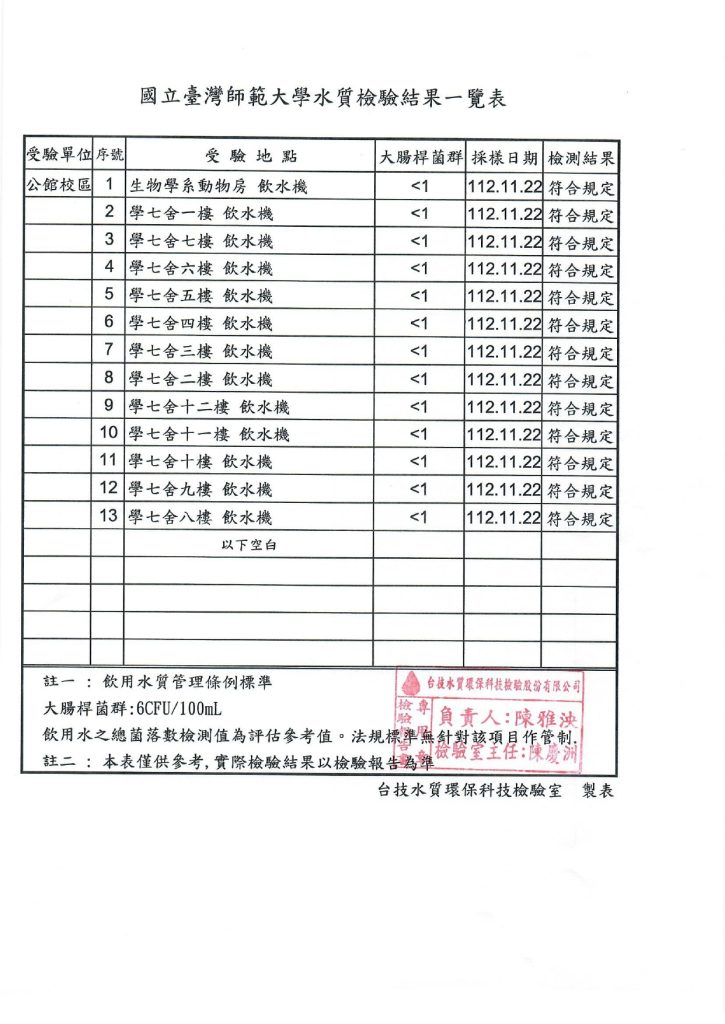
NTNU water dispenser and Water dispensers quality reports
6.3.4 Water-conscious building standards
1.NTNU has several existing and newly constructed buildings that meet Taiwan’s Green Building Certification standards. These include the Multipurpose Activity Center and Student Dormitory at Gongguan Campus, which have received the Green Building Label after passing evaluations for water conservation criteria such as “Site Water Retention” and “Water Resources.” Below are the Green Building Certificates for NTNU-certified buildings.
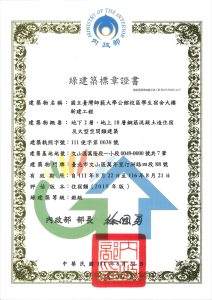
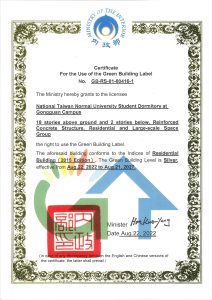
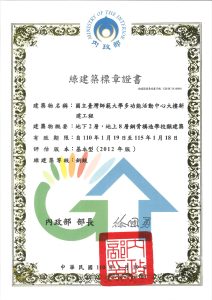
2.In terms of water-saving facilities, all three campuses are equipped with a “digital water meter monitoring system,” allowing real-time online monitoring of water usage in each building. Additionally, NTNU has installed foot-operated faucets, promoting water conservation and supporting hygiene and infection control. Compared to traditional hand-operated faucets, these provide more precise water use and save up to 40% of water consumption.
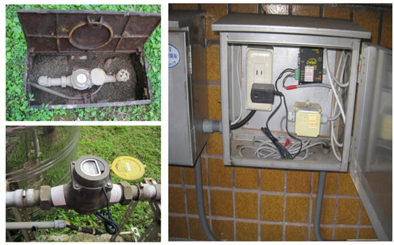
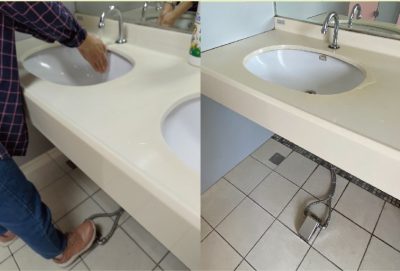
Digital water meter monitoring system and foot-operated faucets.
6.3.5 Water-conscious planting
NTNU practices water-conscious landscaping by minimizing water usage in campus planting. The University cultivates a variety of drought-tolerant plants, including Araucaria (Norfolk Island Pine), Terminalia mantaly (Madagascar Almond), and Livistona (Chinese Fan Palm). At the Heping Campus, aside from the daily watering of the pond and the plants in front of Wen-Hui Plaza by the maintenance and gardening team, the rest of the landscape is left to develop naturally. At the Gongguan Campus, the trees (primarily large trees) are drought-tolerant and mainly rely on groundwater, with watering only when necessary. Further details about the University’s plant species can be found in our landscaping and planting guidelines.
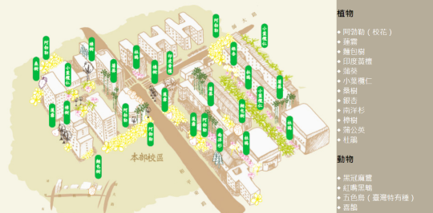
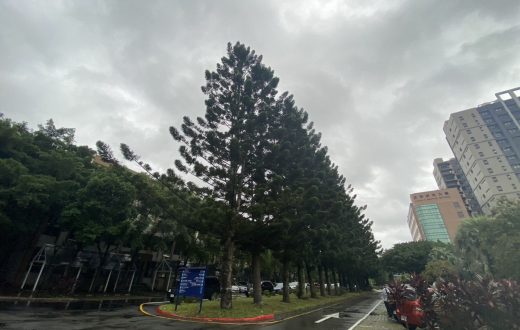
6.4.1 Water reuse policy
NTNU has set up “energy conservation goals” to cultivate water-saving habits among teachers and students through publicity and implementation of various assessment tasks.
NTNU has established a campus energy conservation working group, which holds at least two meetings every year to analyze and report on the water use situation of each campus.
At Linkou Campus of NTNU, the Information and Teaching Building is equipped with a rainwater harvesting system, with a total storage capacity of 177.5 tons. Annually, this system can collect approximately 5,240 tons of rainwater from rooftops, used for landscape irrigation and flushing toilets. The Gongguan Campus has two greywater recycling systems that treat lightly used water, such as from handwashing and dishwashing, for non-contact purposes. This system is estimated to save around 3,000 tons of water annually. Detailed information on each campus’s rainwater harvesting system can be found in our reports.
NTNU 112 Annual Campus Energy Saving Working Group Meeting Meeting Status
次別 | 會議日期 | 地點 | 會議主旨 |
111年第3次校園節能工作小組會議 | 111 年12 月23 日 | 第二會議室 | 1.各校區能源(用水用電)使用分析、報告。 2.年度節能措施辦理進度追蹤。 3.訂定112年度節能措施。 4.節能議案討論。 |
112年第1次校園節能工作小組會議 | 112 年2 月20 日 | 第一會議室 | 1.各校區能源(用水用電)使用分析、報告。 2.年度節能措施辦理進度追蹤。 3.節能議案討論。 |
112年第2次校園節能工作小組會議 | 112 年11 月6 日 | 第一會議室 | 1.各校區能源(用水用電)使用分析、報告。 2.年度節能措施辦理進度追蹤。 3.訂定113年度節能措施。 4.節能議案討論。 |
113年第1次校園節能工作小組會議 | 113 年4 月15 日 | 第一會議室 | 1.各校區能源(用水用電)使用分析、報告。 2.年度節能措施辦理進度追蹤。 3.節能議案討論。 |
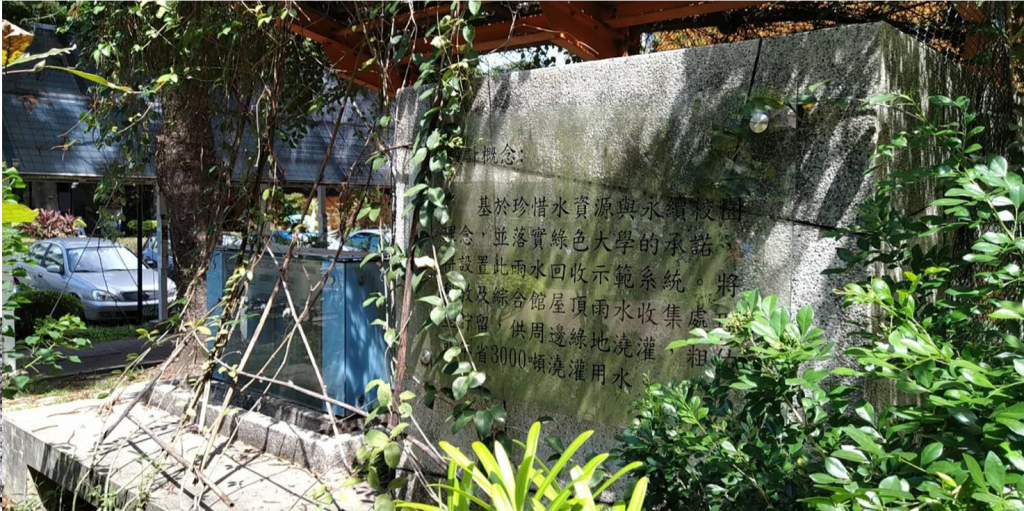
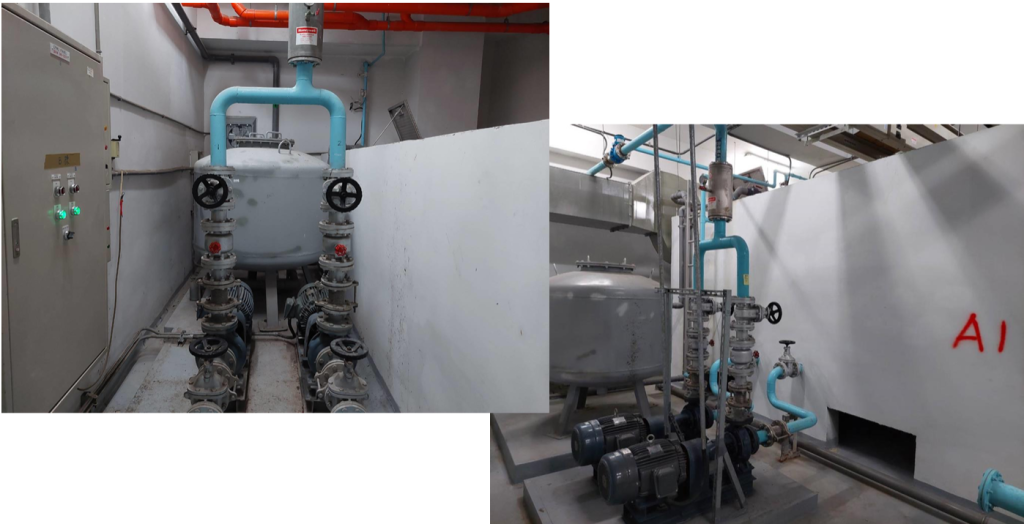
Gongguan Campus Rainwater Recycling Construction
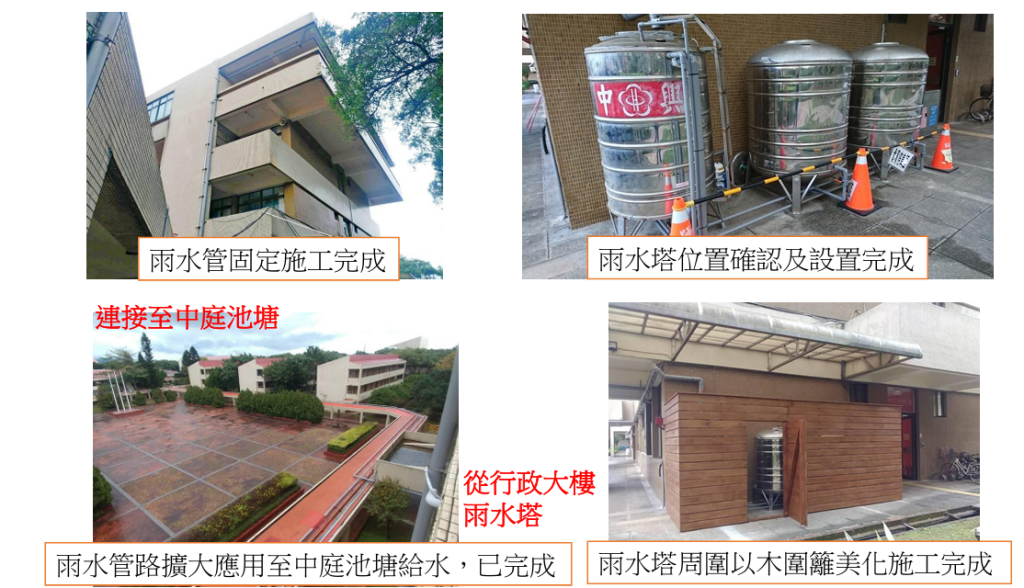
Construction of rainwater recycling system for the administrative building of Linkou campus and Rainwater recycling system for the Information and Teaching Building of Linkou Campus.
6.4.2 Water reuse measurement
- NTNU measures the water reuse situation and total volume across different campuses, with an annual total recovery of approximately 8,239 tons. The two greywater recycling systems at the Gongguan Campus save around 3,000 tons of water annually. At the Linkou Campus, the Administrative Building has a rainwater storage tank with a capacity of 4.5 tons, which collects about 239 tons of rainwater, and the Information and Teaching Building has a tank with a capacity of 173 tons, recovering approximately 5,000 tons annually. This results in an estimated rainwater recovery volume of about 8,239 tons.
- To actively promote sustainable water usage and optimize water resource management, the University has installed a “digital water meter monitoring system” across all three campuses. This system allows for online monitoring of water usage in each building to identify any irregularities, such as pipe leaks. It helps the Office of General Affairs to fix them and prevent waste. Currently, the Heping Campus has 24 digital water meters, while the Gongguan Campus has 273 meters (23 in various buildings and 250 in dormitories), for 297 digital water meters across the campuses.
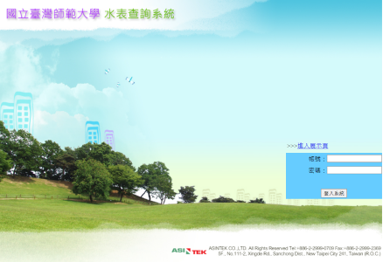

Water meter inquiry system and Digital Water Meter Equipment
6.5.1 Water management educational opportunities
Professor Tzuchau Chang, the Director of the Sustainable Development Center and a faculty member at the Graduate Institute of Sustainable Management and Environmental Education, is leading a project titled “Enhancing Environmental Awareness Among Watershed Residents and Assisting Regional Development Plans.” This initiative utilizes the Taipei Watershed Protection Area as a practical field, integrating the University’s expertise in environmental education. The project promotes correct water usage concepts through multiple workshops and educational activities. It raises awareness of ecological conservation in water resource conservation areas and issues related to fairness and justice in sustainable regional development.
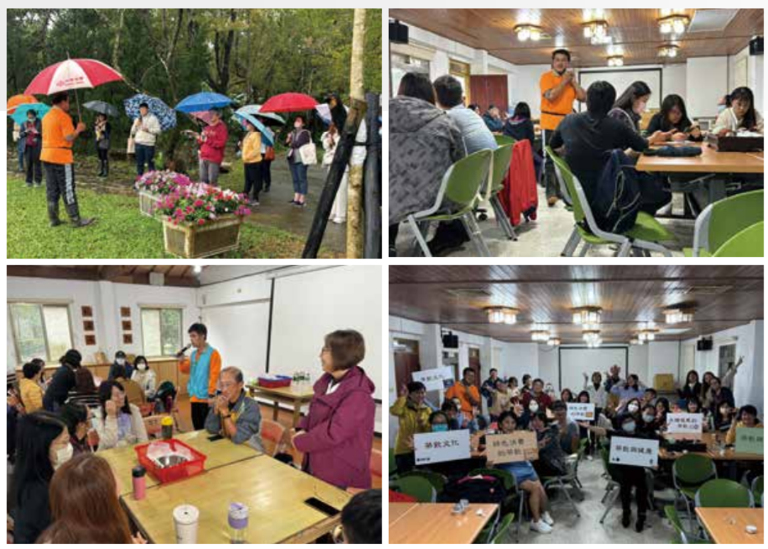
6.5.3 Off-campus water conservation support
Wetlands play a crucial role in water quality purification, water quantity regulation, biodiversity conservation, and climate regulation, making wetland protection an essential part of sustainable water resources conservation. Professor Fang, from the Graduate Institute of Sustainable Management and Environmental Education, serves as the current president of the Taiwan Wetland Society and is also the chair of the Asian chapter of the Society of Wetland Scientists (SWS). In 2023, he organized a series of wetland conservation activities, including a wetland seminar, research lectures, and a Taiwan Wetland Seed Camp, to disseminate knowledge, techniques, and new perspectives on wetland conservation, thereby supporting water resource conservation efforts.

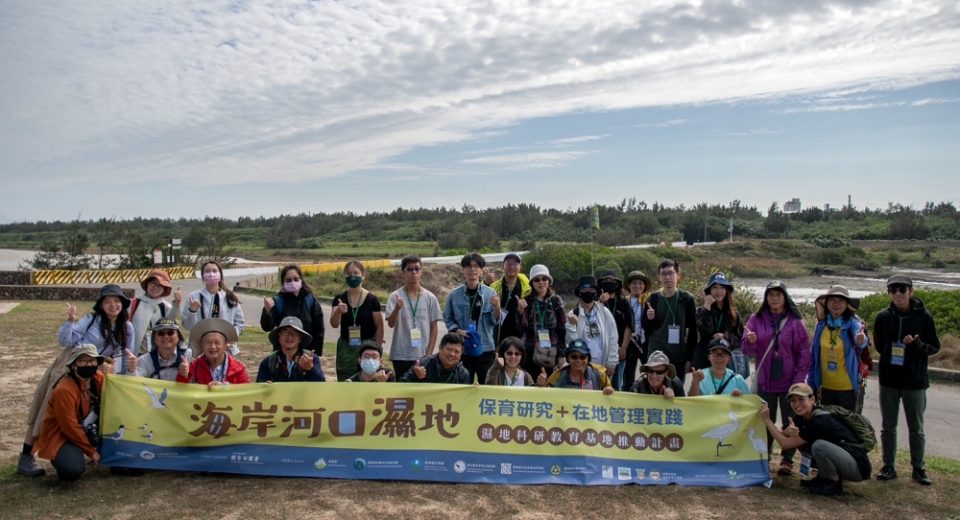
6.5.5 Cooperation on water security
Professor Lee from the Department of Geography collaborates with the Feitsui Reservoir Administration, the Ministry of Economic Affairs Water Resources Agency, and the Taiwan Climate Change Projection and Adaptation Knowledge Information Platform (TCCIP) to focus on the Nanshi River-Feitsui Reservoir water supply system, which is critical for the Taipei metropolitan area’s water resources. The collaboration aims to assess the availability of water resources in Taiwan under climate change, water scarcity, and drought risks, ensuring more effective water resource planning and management.
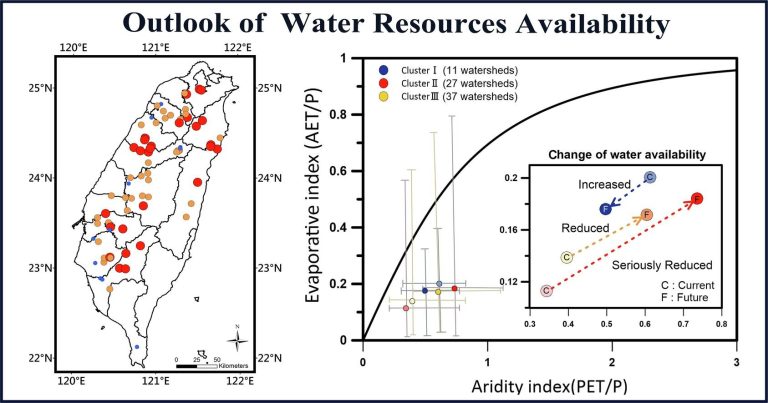
6.5.6 Promoting conscious water usage on campus
1.Enhancing water conservation awareness and action through technology: Since 2017, NTNU has installed the first foot-operated faucets on university campuses across Taiwan, allowing for more precise water usage. Additionally, the University has posted usage instructions in all restrooms to promote water conservation. It has also actively shared and publicized its water-saving achievements with external communities to encourage other institutions to prioritize water conservation efforts.
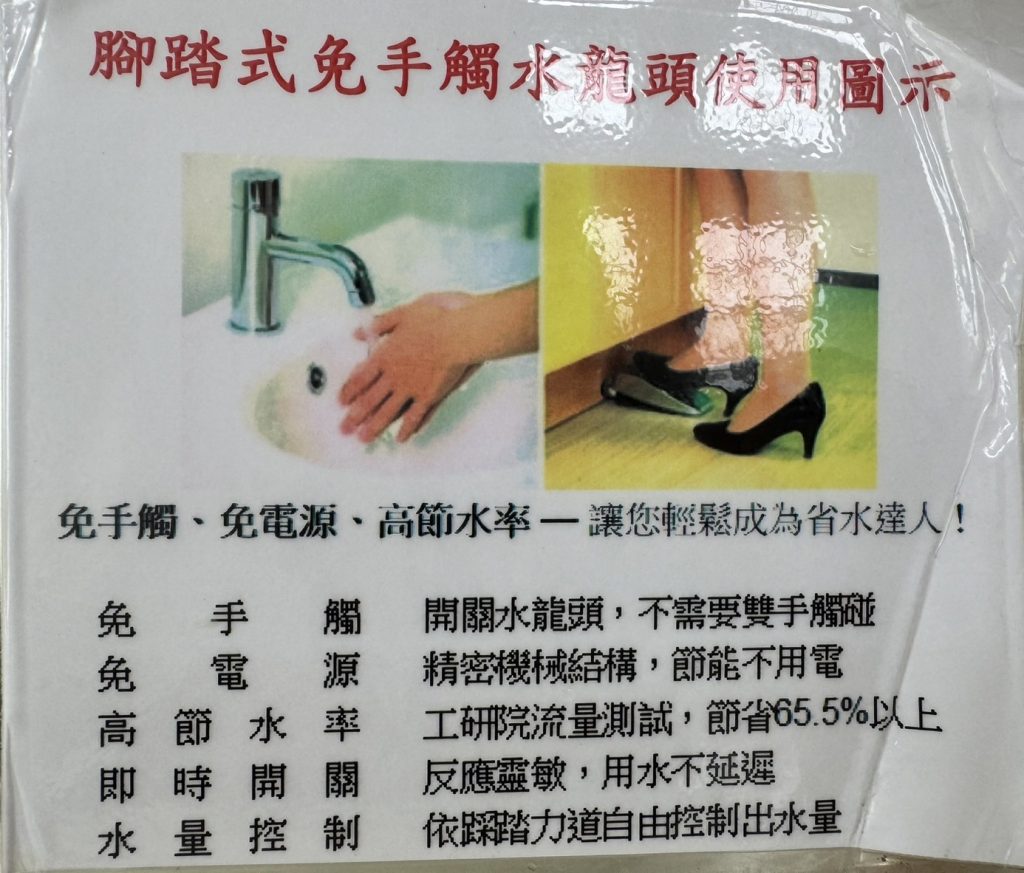
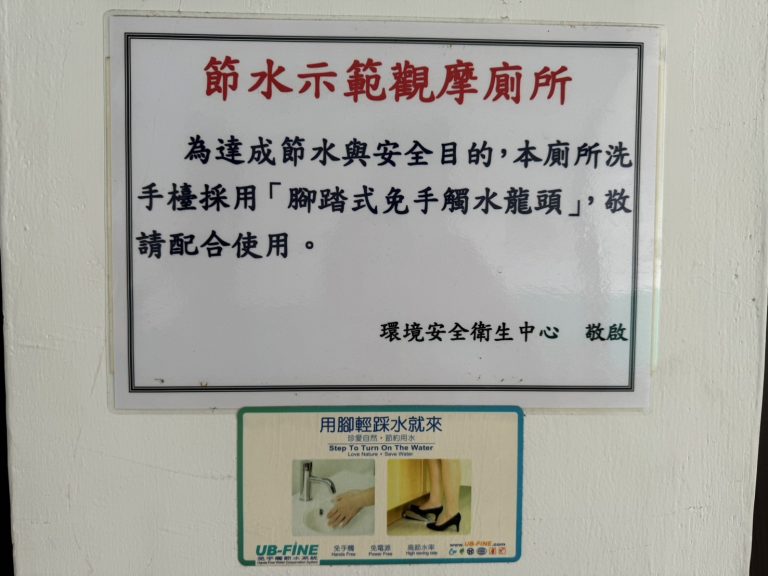
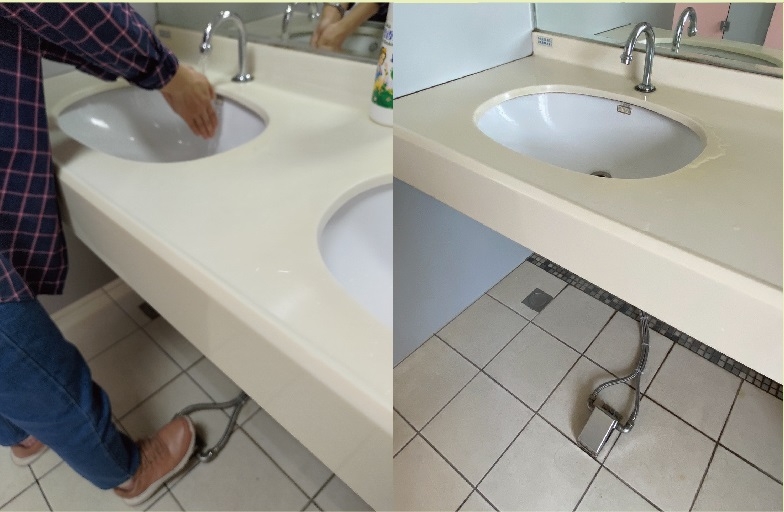
Foot-operated faucet and usage diagram
2.The Environmental and Public Safety Center publishes four issues of an electronic newsletter each year, covering topics such as environmental protection, safety and health, disaster prevention, and energy conservation. The third-quarter issue of the 2023 newsletter featured a section on “Water Conservation,” promoting various water-saving methods and establishing the concept of water conservation among students and staff.
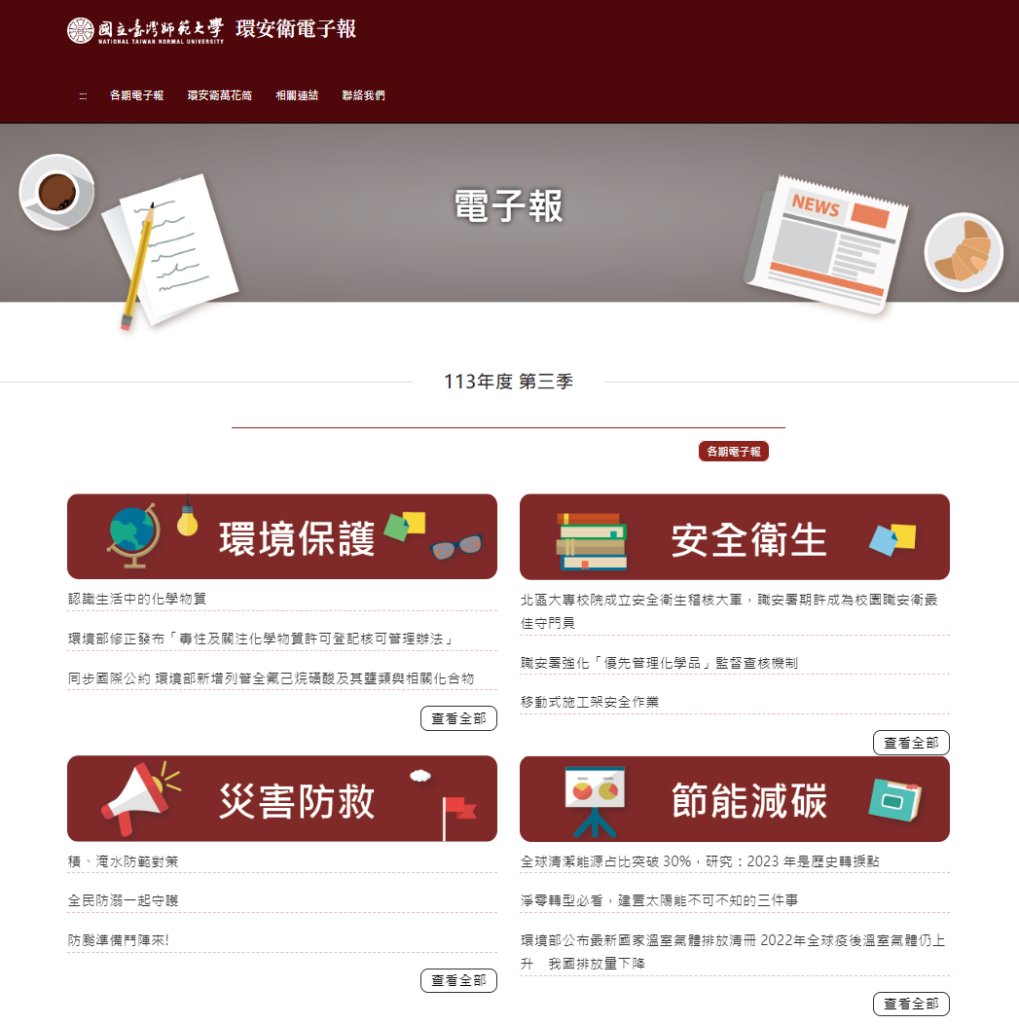
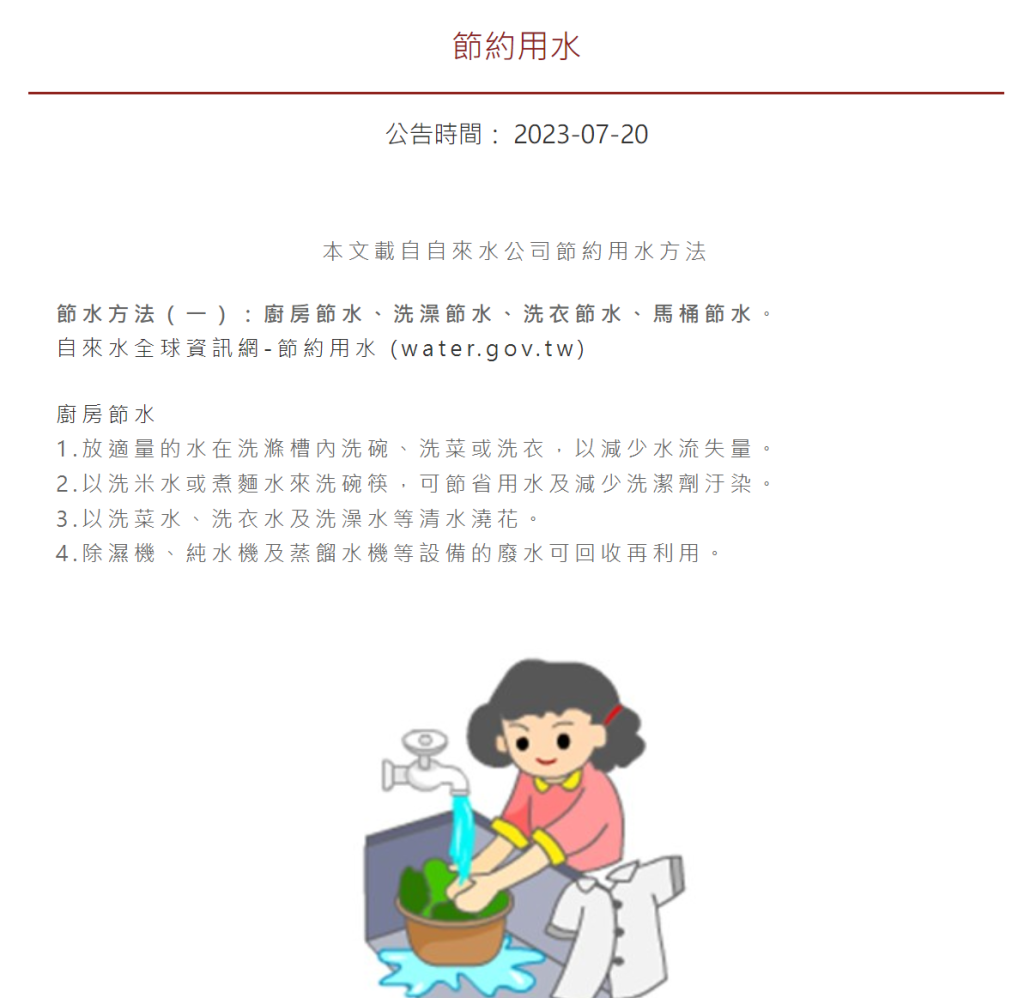
Report on the promotion of water conservation methods.
6.5.7 Promoting conscious water usage in the wider community
1.Professor Tzuchau Chang, the Director of the Sustainable Development Center and a faculty member at the Graduate Institute of Sustainable Management and Environmental Education, is leading a project titled “Enhancing Environmental Awareness Among Watershed Residents and Assisting Regional Development Plans.” This project focuses on raising awareness about water conservation and promoting proper water usage in these communities. Given that reservoir catchment areas are crucial drinking water sources in Taiwan, it is essential to educate local residents about water resource issues to maintain water quality.
2.NTNU hosted the 2023 Science Taipei at Gongguan Campus in response to UNESCO’s “International Year of Basic Sciences for Sustainable Development.” This event combined academic efforts with city government, private organizations, and community groups to hold various public science activities. Students, parents, and citizens interested in science were invited to participate, with one of the critical themes exploring water usage at individual, household, and community levels, aiming to raise awareness about water conservation.


